12th Annual Rocky Mountain Bioinformatics Conference
PROMOTION
Updated August 08, 2014
April 29 - May 2, 2024
Boston, Massachusetts
ISCB Associated Event
May 13 - 16, 2024
Pittsburgh, Pennsylvania
ISCB Official Event
July 12 - 16, 2024
Montreal, Canada
ISCB Flagship Event
September 16 - 20, 2024
Turku, FInland
October 1-3, 2024
Madison, Wisconsin
Oct 22-25, 2024
Okinawa, Japan
ISCB Official Event
November 12 - 15, 2024
Medellin, Colombia
ISCB Official Event
Date TBD
Jan 4 - 8, 2025
Big Island, Hawai'i
Support the society while achieving your marketing goals
Become a ISCB collaborative conference, learn more here
Regional, topical, worldwide - your platform to present science
dedicated to facilitating development for students and young researchers
The ISCB Affiliates program is designed to forge links between ISCB and regional non-profit membership groups, centers, institutes and networks that involve researchers from various institutions and/or organizations within a defined geographic region involved in the advancement of bioinformatics. Such groups have regular meetings either in person or online, and an organizing body in the form of a board of directors or steering committee. If you are interested in affiliating your regional membership group, center, institute or network with ISCB, please review these guidelines (.pdf) and send your exploratory questions to Diane E. Kovats, ISCB Chief Executive Officer (This email address is being protected from spambots. You need JavaScript enabled to view it.). For information about the Affilliates Committee click here.
Topically-focused collaborative communities
Connect with ISCB worldwide
Environmental Sustainability Effort
ISCB is committed to creating a safe, inclusive, and equal environment for everyone
Resource library for education and training materials
Search jobs, find talent
Science at the click of the mouse, recorded talks
High-quality research devoted to computer-assisted analysis of biological data
Latest research and publications
Certifying Quality in Computational Biology Education
Latest updates from ISCB
All things bioinformatics emporium
Highlighting Society events, programs, and achievements
Celebrating scientific achievement and innovation
Honoring our distinguished researchers
Recognizing contributions and achievements
Center for science, collaboration, and training
Updated August 08, 2014

A key part of the success of this event is the financial support and active involvement of our industry sponsors. This is a great opportunity to meet the key individuals in the field of Bioinformatics and Computational Biology from around the world, and gain international exposure to your products or services through the ISCB marketing efforts.
Please take a moment to review the opportunities below. Contact This email address is being protected from spambots. You need JavaScript enabled to view it. or call 352-665-1763 to sponsor this event.
| Platinum: $10,000 |
|
| Gold: $5,000 |
|
| Silver: $3,000 |
|
Other Sponsorship Opportunities: |
| Industry Tech Talk: $1,500 |
Requests for Tech Talks are reviewed for approval by the Organizing Committee. Space is limited and it may not be possible to accept all requests. Deadline to be included in the agenda is November 5, 2014. |
| Display Table: $500 |
|
| Delegate Bags: $1000 |
|
| Keynote Speaker: $1,000 |
|
| Delegate Lanyards: $500 |
|
| Conference Program Book: $1000 |
|
| Student Travel Scholarship: $550 |
|
Customized Sponsorship: |
| Other customized sponsorship opportunities may be available. To discuss opportunities please contact Rocky Conference Coordinator Stephanie Hagstrom This email address is being protected from spambots. You need JavaScript enabled to view it. 352-665-1763 |
Updated Dec 1, 2014
| Go directly to: [Friday - December 12] [Saturday - December 13] | ||
| WEDNESDAY – December 10, 2014 | ||
| START TIME | END TIME | SESSION TYPE |
| 04:00 pm | 06:00 pm | Registration |
| THURSDAY – December 11, 2014 . . . . . . . . . . . . . . . . . . . . . . . . . . . . . LOCATION: Ballroom |
||
| START TIME | END TIME | SESSION TYPE |
| 08:00 am | 09:00 am | Breakfast |
| 08:00 am | 06:00 pm | Registration |
| 09:00 am | 09:45 am | Keynote 1 JILL MESIROV The Broad Institute of MIT and Harvard Integrative Computational Approaches for Genomic Medicine |
| 09:45 am | 10:25 am | Oral Presentations 1 - 4 |
| 10:25 am | 10:45 am | Break |
| 10:45 am | 11:15 am | Keynote 2 JOANNA RODER Biodesix, Inc. Deep Learning, "Deep Data", and Molecular Diagnostics |
| 11:15 am | 11:55 am | Oral Presentations 5 - 8 |
| 11:55 am | 04:00 pm | Ski Break |
| 04:00 pm | 04:30 pm | Keynote 3 ELMAR A. PRUESSE Max Planck Institute for Marine Microbiology AND University of Colorado Denver Tackling the rRNA Big-data Problem with ARB and SILVA |
| 04:30 pm | 05:10 pm | Oral Presentations 9 - 12 |
| 05:10 pm | 05:30 pm | Break |
| 05:30 pm | 06:00 pm | Keynote 4 ROBERT KIRK DELISLE SomaLogic, Inc. SOMAscan™– Based Prediction of Early Kidney Function Decline |
| 06:00 pm | 06:30 pm | Oral Presentations 13 - 15 |
| 07:00 pm | 10:00 pm | Banquet, Thursday December 11, 2014 Location: Il Poggio Restaurant Snowmass Village (Transportation provided from Viceroy Hotel Lobby beginning at 6:45pm) |
| FRIDAY – December 12, 2014 . . . . . . . . . . . . . . . . . . . . . . . . . . . LOCATION: Ballroom |
||
| START TIME | END TIME | SESSION TYPE |
| 08:00 am | 09:00 am | Breakfast |
| 08:00 am | 05:30 pm | Registration |
| 09:00 am | 09:45 am | Keynote 5 DONNA K. SLONIM Tufts University Human Developmental Bioinformatics: A Case Study in Overcoming Data Limitations |
| 09:45 am | 10:25 am | Oral Presentations 16 - 19 |
| 10:25 am | 10:45 am | Break |
| 10:45 am | 11:00 am | Technical Talk RAYMOND TECOTZKY Illumina, Inc. Progress Report: From Sample to Answer - Sequencing in the Cloud Era with the Illumina BaseSpace®Bioinformatics Platform |
| 11:00 am | 11:50 am | Oral Presentations 20 - 24 |
| 11:50 am | 04:00 pm | -->Ski Break -->Group Hike (see Suzi at Registration Desk) |
| 04:00 pm | 05:00 pm | Keynote 6 KIRK JORDAN IBM T.J. Watson Research Experience in Improving de novo Transcriptome Assembly to Address Large Data Sets and FRANK LEE IBM Technical & Platform Computing Worldwide Tackling Big Data Challenges of Genomics by PowerGene |
| 05:00 pm | 06:00 pm | Oral Presentations 25 - 30 |
| 06:00 pm | 08:00 pm | Poster Session -->Information for presenters -->Detailed Poster Abstracts -->Brief Poster List |
| SATURDAY – December 13, 2014 . . . . . . . . . . . . . . . . . . . . . . . . . . . . . LOCATION: Ballroom |
||
| START TIME | END TIME | SESSION TYPE |
| 08:00 am | 09:00 am | Breakfast |
| 08:00 am | 11:30 am | Registration |
| 09:00 am | 09:30 am | Keynote 7 KEVIN M. LIVINGSTON University of Colorado Complex Querying Across Multiple Data Sources Using a Common Biological Model |
| 09:30 am | 10:20 am | Oral Presentations 31- 35 |
| 10:20 am | 10:40 am | Break |
| 10:40 am | 11:20 am | Oral Presentations 36 - 39 |
| 11:20 am | 12:00 pm | Keynote 8 JUDITH BLAKE The Jackson Laboratory Glycolysis Pathways in the Gene Ontology: All Roads Lead to Pyruvate |
| 12:00 pm | Closing | |
| [Top] | ||
Updated Nov 14, 2014
PLATINUM SPONSOR:
IBM's Technical Computing organization is the high performance computing organization in IBM Systems and Technology Group. This group is responsible for the strategy, marketing and identification of areas that can benefit from IBM's high end technology. The life sciences is such an area, and IBM is and will continue to bring valued solutions to life sciences.
IBM's Research Division is a partner with IBM's Technical Computing organization, developing the next generation of high performance computers. In addition, the Research Division has many groups investigating numerous application areas in collaboration with IBM's customers and partners. This includes IBM’s Computational Biology Center with IBM’s new Computational Science Center.
GOLD:
![]()
The Gold Lab at the University of Colorado was established in 1971 by Dr. Larry Gold upon his arrival at the Department of Molecular, Cellular, and Developmental Biology. Starting with basic research on bacteria and bacteriophage, the lab shifted its focus to human disease following the invention of the SELEX process in 1989. While at the university, Dr. Gold served as the chairman of the department from 1988 to 1992. Dr. Gold is one of a handful of people associated with the beginnings of biotechnology in Colorado. He cofounded an early biotech company, Synergen, and then founded NeXstar, a company that discovered Macugen, a drug to treat age-related blindness. Dr. Gold is a member of the National Academy of Sciences. Currently Dr. Gold serves as Chairman of the Board and Chief Executive Officer of SomaLogic, a proteom.
SILVER:
![]()
Biodesix® is a molecular diagnostics company advancing the development of innovative products for precision medicine. The company provides physicians with diagnostic tests for earlier disease detection, more accurate diagnosis, disease monitoring and better therapeutic guidance, which may lead to improved patient outcomes. Biodesix discovers, develops and commercializes multivariate protein diagnostics based on their proprietary advanced integrated analytics and mass spectrometry-based discovery platform. VeriStrat®, a multivariate serum protein test, included in standard of care and therapy, is developed with this technology. The commercially available test provides oncologists with information to help them select between erlotinib and single-agent chemotherapy for advanced lung cancer patients. For more information about Biodesix and the technology, please visit www.biodesix.com/technology/overview.
TECHNICAL TALK:
![]()
A global genomics leader, Illumina provides complete sample-to-answer solutions to the research and clinical communities. Illumina technology generates 90% of the world’s sequencing data. Through collaborative innovation, Illumina is fueling groundbreaking advancements in the fields of oncology, reproductive health, genetic disease, microbiology, agriculture, and forensic science. Learn more at www.illumina.com.
BOOK DONATION AND PRIZES PROVIDED BY:![]()
.........................................................................
![]()
www.springer.com/?SGWID=0-102-0-0-0
[Top]
Updated Feb 09, 2015
![]() Presentations with this icon indicate that the slides are available. Click on icon to download.
Presentations with this icon indicate that the slides are available. Click on icon to download.
| Go directly to: [Friday - December 12] [Saturday - December 13] | ||
| WEDNESDAY – December 10, 2014 | ||
| START TIME | END TIME | SESSION TYPE |
| 04:00 pm | 06:00 pm | Registration |
| THURSDAY – December 11, 2014 . . . . . . . . . . . . . . . . . . . . . . . . . . . . . LOCATION: Ballroom |
||
| START TIME | END TIME | SESSION TYPE |
| 08:00 am | 09:00 am | Breakfast |
| 08:00 am | 06:00 pm | Registration |
| 09:00 am | 09:45 am | Keynote 1 JILL MESIROV The Broad Institute of MIT and Harvard Integrative Computational Approaches for Genomic Medicine |
| 09:45 am | 09:55 am | Oral Presentation 1 Automatic Discovery of Regulatory Networks from Morphological Experimental Data Presenting Author: Daniel Lobo Tufts University, USA |
| 09:55 am | 10:05 am | Polysaccharide A: a widely distributed immunoregulatory microbial product Presenting Author: Matthew Rhodes University of Colorado, Denver |
| 10:05 am | 10:15 am | Oral Presentation 3 Meta-analysis leads to deeper understanding of cellular senescence Presenting Author: Chris Morrissey Buck Institute |
| 10:15 am | 10:25 am | Oral Presentation 4 Characterizing the landscape of biomedical ontologies via deductive entailment Presenting Author: William Baumgartner Jr University of Colorado Denver |
| 10:25 am | 10:45 am | Break |
| 10:45 am | 11:15 am | JOANNA RODER Biodesix, Inc. Deep Learning, "Deep Data", and Molecular Diagnostics |
| 11:15 am | 11:25 am | Oral Presentation 5 A Bayesian framework for Signature-driven Protein Quantification Presenting Author: Bobbie-Jo Webb-Robertson Pacific Northwest National Laboratory |
| 11:25 am | 11:35 am | Integrating Data in a Microbiome Context Presenting Author: Michael Shaffer University of Colorado - Denver |
| 11:35 am | 11:45 am | Oral Presentation 7 Dietary Influences on the Incidence of Alzheimer Disease: Converging Inferences by Disparate Algorithms Presenting Author: George Acquaah-Mensah MCPHS University |
| 11:45 am | 11:55 am | Oral Presentation 8 Comparative genomics between frogs Xenopus laevis and Xenopus tropicalis Presenting Author: Gonzalo Riadi Pontificia Universidad Católica de Chile |
| 11:55 am | 04:00 pm | Ski Break |
| 04:00 pm | 04:30 pm | Keynote 3 ELMAR A. PRUESSE Max Planck Institute for Marine Microbiology AND University of Colorado Denver Tackling the rRNA Big-data Problem with ARB and SILVA |
| 04:30 pm | 04:40 pm | Oral Presentation 9 Comparison of Phylogeographic Node Flux with Local Disease Trends Presenting Author: Daniel Magee Arizona State University |
| 04:40 pm | 04:50 pm | Oral Presentation 10 Co-expression Network Hubs in Hypoxia and Acclimatization to High Altitude Presenting Author: Daniel Dvorkin University of Colorado |
| 04:50 pm | 05:00 pm | Oral Presentation 11 Network-based analysis for large environment microbial genomics data Presenting Author: Erliang Zeng University of South Dakota |
| 05:00 pm | 05:10 pm | Oral Presentation 12 Predicting survival for diverse patient cohorts using large-scale cancer genomics data Presenting Author: Nicolle Witte University of Colorado - Anschutz Medical Campus |
| 05:10 pm | 05:30 pm | Break |
| 05:30 pm | 06:00 pm | Keynote 4 ROBERT KIRK DELISLE SomaLogic, Inc. SOMAscan™– Based Prediction of Early Kidney Function Decline |
| 06:00 pm | 06:10 pm | Oral Presentation 13 Global Survey of Protein Complexes from the Sulfate Reducer Desulfovibrio vulgaris: evidence for lower connectivity within stable bacterial interactomes Presenting Author: Maxim Shatsky Lawrence Berkeley National Lab |
| 06:10 pm | 06:20 pm | Oral Presentation 14 EMIRGE 2: Improved resolution of microbial community structure Presenting Author: Adrienne Narrowe University of Colorado Denver |
| 06:20 pm | 06:30 pm | RNABindRPlus Predicts RNA-Protein Interface Residues in Multiple Protein Conformations Presenting Author: Carla Mann Iowa State University |
| 07:00 pm | 10:00 pm | Banquet, Thursday December 11, 2014 Location: Il Poggio Restaurant Snowmass Village (Transportation provided from Viceroy Hotel Lobby beginning at 6:45pm) |
| [top] | ||
| FRIDAY – December 12, 2014 . . . . . . . . . . . . . . . . . . . . . . . . . . . LOCATION: Ballroom |
||
| START TIME | END TIME | SESSION TYPE |
| 08:00 am | 09:00 am | Breakfast |
| 08:00 am | 05:30 pm | Registration |
| 09:00 am | 09:45 am | Keynote 5 DONNA K. SLONIM Tufts University Human Developmental Bioinformatics: A Case Study in Overcoming Data Limitations |
| 09:45 am | 09:55 am | Oral Presentation 16 Integrative Genomics Approaches for Predicting Drug Synergies Presenting Author: Andrew Goodspeed University of Colorado-Anschutz Medical Campus |
| 09:55 am | 10:05 am | Oral Presentation 17 Prediction and validation of genes regulating breast cancer metastasis Presenting Author: Eran Andrechek Michigan State University |
| 10:05 am | 10:15 am | Oral Presentation 18 The Inverse Relationship Between Sample Size and Differentially Expressed Genes in the selected Microarray Experiments Presenting Author: Akram Samarikhalaj Ryerson University |
| 10:15 am | 10:25 am | Oral Presentation 19 Calculating prior and posterior probabilities of concepts in conceptually annotated corpora Presenting Author: Negacy Hailu University of Colorado |
| 10:25 am | 10:45 am | Break |
| 10:45 am | 11:00 am | RAYMOND TECOTZKY Illumina, Inc. Progress Report: From Sample to Answer - Sequencing in the Cloud Era with the Illumina BaseSpace®Bioinformatics Platform |
| 11:00 am | 11:10 am | Oral Presentation 20 RNABindRPlus Parallelization: Faster Prediction of RNA-Binding Residues in Proteins Presenting Author: John Hsieh Iowa State University |
| 11:10 am | 11:20 am | Oral Presentation 21 A phylogenomic approach to assess global genetic diversity and intrapatient evolution of clinical Mycobacterium abscessus strains Presenting Author: Rebecca Davidson National Jewish Health |
| 11:20 am | 11:30 am | Oral Presentation 22 Discovering Disease Associated Molecular Interactions Using Discordant Correlation Presenting Author: Charlotte Siska University of Colorado Anschutz Medical Campus |
| 11:30 am | 11:40 am | Oral Presentation 23 A pipeline for virus phylogeography that accounts for geospatial observation error Presenting Author: Matthew Scotch Arizona State University |
| 11:40 am | 11:50 am | Oral Presentation 24 Prediction of bacteriocin associated operons Presenting Author: James Morton University of Colorado Boulder |
| 11:50 am | 04:00 pm | -->Ski Break -->Group Hike (see Suzi at Registration Desk) |
| 04:00 pm | 05:00 pm | Keynote 6 KIRK JORDAN IBM T.J. Watson Research Experience in Improving de novo Transcriptome Assembly to Address Large Data Sets and FRANK LEE IBM Technical & Platform Computing Worldwide Tackling Big Data Challenges of Genomics by PowerGene |
| 05:00 pm | 05:10 pm | Oral Presentation 25 A Novel Visualization Technique for the Discovery of Inter-strain Recombination in Apicomplexans Presenting Author: Javi Zhang University of Toronto |
| 05:10 pm | 05:20 pm | Oral Presentation 26 Computational Methods to Study Differential Transcription Presenting Author: Debra Goldberg, University of Colorado Boulder |
| 05:20 pm | 05:30 pm | Oral Presentation 27 Modeling Binding Affinity of the Multiple Zinc-Finger Protein Prdm9 Presenting Author: Greg Carter The Jackson Laboratory |
| 05:30 pm | 05:40 pm | Oral Presentation 28 Taking an omics approach to phenotype responses to cigarette smoke in humans in vivo and in vitro: comparison with healthy smokers and those with COPD Presenting Author: Mark Pau-Clark Imperial College London |
| 05:40 pm | 05:50 pm | SASE-hunter – a method for detecting signatures of accelerated somatic evolution in cancer genomes Presenting Author: Kyle Smith University of Colorado |
| 05:50 pm | 06:00 pm | Oral Presentation 30 Phylogeny-wide Discovery of Bacterial Transcription Factor Binding Motifs by Protein Family-based Approach Presenting Author: Maxim Shatsky Lawrence Berkeley National Lab |
| 06:00 pm | 08:00 pm | Poster Session: -->Information for presenters -->Detailed Poster Abstracts -->Brief Poster List |
| [top] | ||
| SATURDAY – December 13, 2014 . . . . . . . . . . . . . . . . . . . . . . . . . . . . . LOCATION: Ballroom |
||
| START TIME | END TIME | SESSION TYPE |
| 08:00 am | 09:00 am | Breakfast |
| 08:00 am | 11:30 am | Registration |
| 09:00 am | 09:30 am | Keynote 7 KEVIN M. LIVINGSTON University of Colorado Complex Querying Across Multiple Data Sources Using a Common Biological Model |
| 09:30 am | 09:40 am | A Model of the Colonic Crypt Microenvironment Presenting Author: Violeta Kovacheva University of Warwick |
| 09:40 am | 09:50 am | Oral Presentation 32 Dev Ops and Automation, key tools in the bioinformaticians tool box Presenting Author: Simon Twigger BioTeam |
| 09:50 am | 10:00 am | Oral Presentation 33 Characterizing bladder cancer cell lines as models of solid tumor biology Presenting Author: Somsak Phattarasukol University of Colorado Anschutz Medical Campus |
| 10:00 am | 10:10 am | Oral Presentation 34 A computational and experimental method for combinatorial drug discovery Presenting Author: Muhammad Kashif Uppsala University |
| 10:10 am | 10:20 am | Biomed Summarization Of Topics Presenting Author: Prabha Yadav University of Colorado School of Medicine, Denver |
| 10:20 am | 10:40 am | Break |
| 10:40 am | 10:50 am | Oral Presentation 36 Beyond the coding mutations in Pan-cancer genomes Presenting Author: Subhajyoti De University of Colorado |
| 10:50 am | 11:00 am | MEseq, a software package for bisulfite sequencing data analysis by regression hidden Markov model Presenting Author: Kui Shen National Institute of Allergy and Infectious Diseases |
| 11:00 am | 11:10 am | Oral Presentation 38 Coreference Annotations in the CRAFT Corpus – Statistics and Performance Analysis Presenting Author: Natalya Panteleyeva University of Colorado |
| 11:10 am | 11:20 am | Withdrawn Oral Presentation 39 Virulence-Associated Role for the Universal Stress Protein in Helicobacter pylori Infections Presenting Author: Shaneka Simmons Jackson State University |
| 11:20 am | 12:00 pm | Keynote 8 JUDITH BLAKE The Jackson Laboratory Glycolysis Pathways in the Gene Ontology: All Roads Lead to Pyruvate |
| 12:00 pm | Closing | |
| [top] | ||
Application deadline: October 31, 2014, 5:00pm Eastern Time
Award Amount: $1,850.00
FASEB will provide two categories of MARC travel fellowships for the Rocky 2014 Conference.
ELIGIBILITY AND REQUIREMENTS: >>Click here<<
TRAVEL AWARD APPLICATIONS: Scroll down this page to Applications and look for 2014 ISCB Meetings on the list.
Updated Nov 20, 2014
Links within this page:
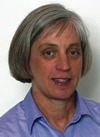 |
Judith A Blake, Ph.D. Associate Professor The Jackson Laboratory Title: Glycolysis Pathways in the Gene Ontology: All Roads Lead to Pyruvate Abstract: The Gene Ontology (GO) is a freely-available resource that provides connections between gene products and a structured, controlled vocabulary of biological terms used to describe how gene products function. The representation of biochemical pathways presents a challenge because different species may utilize different enzymatic activities or substrates to carry out similar processes. Glycolysis is an example of an overall process that is well conserved among species, but varies with respect to input molecules and enzymatic activities. We describe a strategy to represent a taxonomy of glycolytic processes that accounts for variation seen in different biological contexts. We factor out core, conserved processes, and represent variations as subtypes. Glycolytic processes are defined by axioms that include the parent superclass process, the molecular functions that are necessary parts of the process and the input and output chemical entities. We group the conserved processes by shared intermediate substances, such as a shared glucose-6-phosphate intermediate. Creating formal definitions for pathways allows use of OWL-based reasoning for further inferred classification. Inclusion of necessary molecular functions not only aids ontology maintenance but also guides annotators in determining which genes are directly involved in a process. We use glycolysis in mouse sperm to show how curators can use the necessary functions associated with glycolytic process to infer that subtype for annotation and how users can explore annotations to determine which isoforms of an enzyme are used in a given biological context. This work supported by NIH:NHGRI grants U41HG002273 to GOC and U41HG003751 to Reactome Knowledgebase. CV: web |
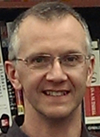 |
Robert Kirk DeLisle, PhD Principal Scientist SomaLogic, Inc. Colorado Title: SOMAscan™– Based Prediction of Early Kidney Function Decline Robert Kirk DeLisle1; Laila Bruun2; Robert Mehler1; Britta Singer1; Stephen A. Williams1; Anders Christensson2 1SomaLogic, Boulder, CO; 2Dept. Nephrology, Skåne Univ. Hosp., Lund Univ., Malmö, Sweden Abstract: Glomerular filtration rate (GFR) is defined as the volume of fluid filtered by the kidney per unit time and is the best measure of renal function. Clearance of certain exogenous substances from the blood allows direct measure of GFR but is not suitable for routine clinical practice. Endogenous clearance markers creatinine and cystatin-C are attractive because they offer simpler means of estimating GFR. However, these estimates are relatively imprecise, especially above 60ml/min/1.73m2. Measuring both markers does not resolve this limitation. The result is that early, significant loss of functioning renal mass may go unrecognized, and the opportunity for timely, focused intervention is lost. Using SOMAscan™, a high-throughput, multiplexed proteomic assay that simultaneously measures >1100 proteins from small volumes of biological samples, we assayed 183 plasma samples collected at Skåne University Hospital, Sweden from male subjects with GFR>60 as measured by Iohexol clearance, and developed models to assess the ability of protein levels to predict GFR above 60 ml/min/1.73m2. Model performances were compared to those of creatinine and cystatin C, and found to better predict measured GFR >60 (predictive correlation of 0.70 vs. 0.55). We conclude that it will be possible to develop a more clinically useful blood test that measures GFR>60 ml/min/1.73 m2, enabling detection and intervention in cases of early, clinically relevant renal function loss. CV: pdf |
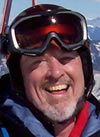 |
Kirk E. Jordan, PhD IBM Distinguished Engineer Emerging Solutions Executive & Assoc. Prog. Director Computational Science Center IBM T.J. Watson Research Title: Experience in Improving de novo Transcriptome Assembly to Address Large Data Sets Co-Authors: Chang-Sik Kim, Vipin Sachdeva, Martyn Winn Abstract: The world and the life sciences are awash in data. The problem for computing is no longer the ability to compute but the inability to move data and handle large data sets. In this talk, we will describe the work we have done to handle large data sets for de novo transcriptome assembly through developing parallel, distributed memory versions of the Broad Institute’s Trinity workflow. We will relate our efforts in using experimental hardware that gives insight into new systems architecture to better handle such data movement and large data sets. CV: web |
 |
Frank Lee, Ph.D. Lead Architect, IBM Genomics Solution Technical Advisor for Life Sciences Senior-certified Solution Architect IBM Technical & Platform Computing Worldwide Title: Tackling Big Data Challenges of Genomics by PowerGene Abstract: I will discuss the challenges presented by the explosive growth of data and computation in genomics and share an architecture and best practice to 1) acquire, store, access data in scale; 2) build a high-speed (turnaround and throughput) computing infrastructure to process genomic and bioinformatics workload/workflow; 3) make the infrastructure smart by converging data river into data lake. Using real-life projects as case studies, I will share our approaches to tackle the challenges, the ecosystem we are enabling, some of the success stories, lesson learned and highlight potential for collaboration among genomic research communities. Biography: pdf |
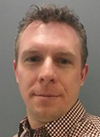 |
Kevin M. Livingston, PhD Research Associate University of Colorado Title: Complex Querying Across Multiple Data Sources Using a Common Biological Model Abstract: A wealth of biomedical information currently exists spread out over numerous independent data sources. Querying across those data sources has historically been difficult. The Knowledge Base of Biomedicine (KaBOB) integrates information from 20 large prominent data sources and formally represents it in OWL using a common biomedical model grounded in the OBOs (Open Biomedical Ontologies). This enables complex queries across those data sources to be written in biomedical terms, as opposed to working with multiple source-specific data models and identifiers. We demonstrate how such a knowledge base can be interrogated in multiple ways to answer complex biomedical questions. Examples include looking for explanations of synthetic lethal drug-gene interactions in cells; or asking what drugs target what gene products that are in the mitochondria and involved in oxidative phosphorylation. The answers to these questions do not exist in a single database. Additionally KaBOB can answer these questions at multiple levels of granularity and abstraction, for example, querying about species-specific genes versus including information about homologous genes in other model organisms. Questions to KaBOB can be performed by direct querying of the underlying RDF using SPARQL, as well as by deriving results via back-chaining through the data using Prolog. The modeling used by KaBOB enables formal reasoning methods to be employed to derive deductively entailed relationships from the explicitly asserted knowledge. In the near future we hope to also explore abductive inference methods that hypothesize about missing information that if present would help produce more coherent explanations CV: web |
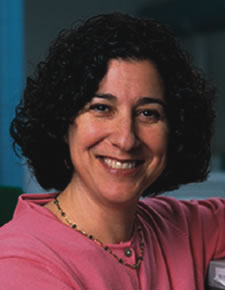 |
Jill P. Mesirov Associate Director and Chief Informatics Officer Director, Computational Biology and Bioinformatics The Broad Institute of MIT and Harvard Cambridge, MA, USA Title: Integrative Computational Approaches for Genomic Medicine The acceleration of data acquisition, and the corresponding availability of increasing amounts of both genetic and functional data, is changing the face of biomedical research. Computational approaches and new methods can take advantage of these data and bring the promise of improved understanding and treatment of disease. I will describe some approaches that leverage multiple data types and emphasize the use of more biologically interpretable models. In particular I’ll describe our work integrating high-level clinical and genomic features to stratify pediatric brain tumor patients into groups with high and low risk of relapse after treatment. The approach is more accurate than previous models; highlights possible future drug targets; and represents one of the few such predictors that generalized to a completely independent patient cohort. In addition, I will present a recently developed method to shed light on the functional correlates of genetic variants. Finally, I will review the software through which we make our methods available to the research community. CV: web |
 |
Elmar A Pruesse, PhD Max Planck Institute for Marine Microbiology AND University of Colorado Denver Title: Tackling the rRNA Big-data Problem with ARB and SILVA Abstract: Since Fox and Woese pioneered the use of ribosomal RNA some four decades ago, related methods have become essential for characterizing microbial communities. Accordingly, a vast body of over 4 million rRNA sequences has been accumulated. As evidenced by dedicated databases and tools such as RDP, greengenes, mothur and qiime, specialized methods are required to successfully conduct analyses given the current volume of reference and study data. Here, we present recent improvements to the combination of resources, services and tools offered by ARB (from arbor, lat. tree) and SILVA (lat. forest) to facilitate rRNA-based studies. The SILVA database includes large and small subunit rRNA data from all three domains, data integration from various sources and an up-to-date curated taxonomy. The SILVA website (~400 users per day) offers services such as sequence classification with SINA or the TestPrime tool for primer coverage validation. ARB integrates a broad range of external tools, unique algorithms and data management and visualization features into a single desktop application with a graphical interface. Version 6 brings enhancements to performance, stability, memory footprint, automation and usability as well as additional or enhanced internal and external analysis methods. The new SILVAngs service streamlines the analysis of rRNA amplicon data from next generation sequencing into an intuitive web interface. Built on top of the SILVA database pipeline, it always uses the most current reference data and requires no installation. Results include commonly computed microbial ecology statistics as well as novel plots and easy export of processed reads to ARB. |
 |
Joanna Roder, PhD Senior Director of Data Analytics R&D Biodesix, Inc. Title: Deep Learning, "Deep Data", and Molecular Diagnostics Abstract: Recent developments in machine learning techniques based on deep learning neural networks have led to huge increases in performance in many “Big Data” problems, such as image recognition and natural language processing. While “Big Data” problems typically consist of millions of instances with hundreds of attributes, data sets arising within the field of personalized medicine usually have thousands of attributes for only a few hundreds of samples. Thus, learning from data generated by molecular multiplexed probes, such as NextGen sequencing or Deep MALDI, in genomic or protein profiling, respectively, can be thought of as a “Deep Data” problem. This presentation will describe how ideas from deep learning can be applied to the “Deep Data” sets arising from molecular profiling of patient samples. We will present the main principles and give examples from the genomic and proteomic arenas to show how these methods can be tailored to the development of clinically useful, multivariate, molecular diagnostic tests. Biography: pdf |
 |
Donna K. Slonim Associate Professor of Computer Science Associate Professor of the Tufts School of Medicine Genetics Faculty, Sackler School of Graduate Biomedical Sciences Tufts University Medford, MA, USA Title: Human Developmental Bioinformatics: A Case Study in Overcoming Data Limitations Abstract: A growing awareness of developmental impacts on lifelong human health has increased interest in improving our understanding of human development at the molecular level. However, existing data collections characterizing gene function and disease relevance are typically imperfect, incomplete, and lacking in sufficient context. This state of affairs has limited the translational application of genomic data to developmental disorders. In this talk, we will discuss such barriers and our experiences addressing them. Adding context-specific functional annotation has improved our ability to interpret developmental data sets. Pooling imperfect gene-disease data across related disease processes has helped us link developmental processes to health outcomes. A new-anomaly detection paradigm for the analysis of expression data sets facilitates interpretation of individual samples. Our recent results in developmental bioinformatics illustrate how domain expertise, contextual awareness,and scaling up can help us overcome the limits of the data. CV: .pdf |
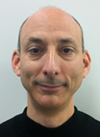 |
TECHNICAL TALK Raymond Tecotzky Market Manager, Informatics Ecosystem Illumina, Inc. Title: Progress Report: From Sample to Answer - Sequencing in the Cloud Era with the Illumina BaseSpace®Bioinformatics Platform Abstract: There have been many improvements to the Illumina BaseSpace Informatics Platform and significant growth in its usage over the past year. In my short talk, I will describe and demonstrate many of the new and exciting Sample to Answer Applications available from Illumina, including the Apps on BaseSpace and BaseSpace Onsite that enable them. There are many choices for bioinformatics analysis available today in the genomics community and we will show you why we believe that BaseSpace and BaseSpace Onsite offer a better way to analyze your genomic data and represent the new trend for how all genomic data will be stored, analyzed, and shared in the future. Biography: pdf |
TOP |
|
Abstract Submissions are closed.
Submission Deadline: October 15, 2014
The Rocky 2014 Conference will provide opportunities for short "flash" presentations (10 minute talks) and poster presentations on current projects from as many attendees as possible. Original presentations (including significant works-in-progress) are solicited in all areas that involve the application of advanced computational methods to significant problems in biology or medicine.
Click on the link above to access the Submission Form you may select to give a "poster presentation", an "oral presentation", or "both". We will attempt to accommodate all requests and will confirm your request on November 8, 2014
Please note: All presenters must register as a conference attendee by November 14 in order to give a presentation at Rocky 2014.
ISCB Members enjoy discounts on conference registration (up to $150), journal subscriptions, book (25% off), and job center postings (free).
Connecting, Collaborating, Training, the Lifeblood of Science. ISCB, the professional society for computational biology!
Giving never felt so good! Considering donating today.